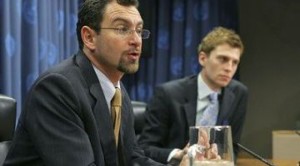
Two years on, South Sudan is beginning to build a nation, both in institutions and in the hearts of its people. There is a lot of hard work ahead and although the future is not assured, there is a real chance for the fledgling state, but it will need the continued support of the EU to develop.
This is the key message of Toby Lanzer, Deputy special Representative of the UN secretary General. He spoke with New Europe about what needs to be done and how the best way of building a nation’s future is through education.
First of all, he explained the situation, “This is a country where everything needs doing. This country inherited nothing, no civil service or functioning state institutions. There are political challenges, humanitarian challenges, rights, development.”
Not the easiest of tasks to try to solve. “It’s daunting. When I wake up in the morning every day feels like the first day. I take solace in listening to people who have been engaged here for so many years. They tell me that it’s a lot better than it was a few years ago. They mean that slowly and surely, there is a semblance of state authority in the 10 state capitals.”
Another sign of the beginnings is education. “There are more and more children in school. When the peace agreement was signed there were 300,000 children in school. Now there are 1.4 million. It’s true there are one million kids who are not in school, but it’s a glass is half full, not half empty situation.”
Lanzer also tells of roads being constructed and being safe with the militia gunmen and others who ‘collected taxes’ no longer to be found in many of their old haunts. One person reported to Lanzer on a trouble free visit to a remote town, almost adding as an afterthought “Oh, and there were no mines.”
Violence has dropped and fewer civilians are dying says Lanzer, “There is one stark exception to that, Pibor county in Jonglei, where there is an intractable situation that is leading to displacement, violence and continues to make people’s lives unsafe and insecure.”
“There is some light at the end of a very long tunnel,” is his conclusion. “Building a state is going to take decades,” says the humanitarian, but there are surprising stories in the new nation.
Lanzer talls of Guor Marial, a runner who fled the country after no less than 28 of his relatives were killed. Now he’s back and competed in the 2012 London Olympics, under the flag of the International Olympic Committee, because there wasn’t a national organisation in South Sudan.
Although he didn’t win his event, the marathon, he did become a hero and inspiration in the country.
While the bean counters and policy experts may be looking at institutional capacity, Lanzer knows that people like this single athlete can help build a nation in the hearts of the people.
One aspect that brings hope, is the role of women, who hold around 25% of ministerial posts and Lanzer is impressed by their commitment and energy. “These are strong women with clear views and taking important portfolios. I’m a big believer in empowering women incountries like this because they do more of the caring. This sounds trite, but it is true.”
He continues, “There is no guarantee that South Sudan will succeed. But, with hard work and discipline it could be like Kenya or Uganda in a couple of decades time.”
It takes time to transform a place that is incredibly poor to one there people have a roof over their heads, kids go to school, the sick can get treated in a clinic and you’ve got roads that youcan use for trade. This, in an environment where you don’t get shot at during the night, well these are great accomplishments,” he says, while noting that “in Brussels and other cities, sometimes people have forgotten the basics that are crucial to moving things forward.”
There is talk, in some political circles, that aid should be cut during austerity. Lanzer is dismissive. “I can give you the moral, the ethical solidarity argument. I can give you the argument that it makes sense if you want to expand your markets, I can give you the self defence argument, there are lots of good reasons why the international community have to engage.”
South Sudan has the curse and blessing of oil. “The oil sector is absolutely key, for funding projects like road building, but also for developing a sovereign wealth fund, for the costs of running a state when there is no oil. Oil is vital for people today and generations to come.”
However, oil has caused trouble between Sudan and it’s newly independent neighbour, with two impoverished states fighting over revenue.
He looks back on his experience, “Timor faced the same sort of difficulties with its neighbour, so it is entirely possible that relations can improve. There will be short term shocks and disruptions in the relationship, as there were in Timor.”
There is one message he has for Brussels, “It’s important we stay the course,” he says. Noting that quick answers are increasingly demanded, Lanzer knows that building a nation, from nothing takes time, and a lot of support. neurope